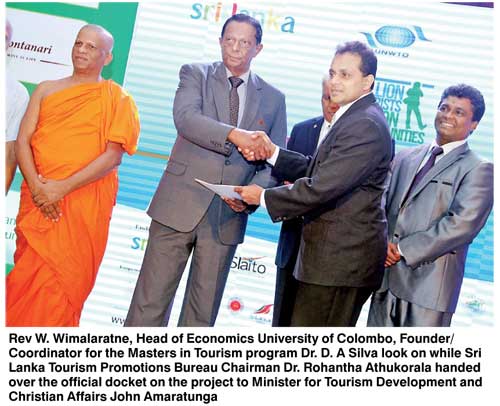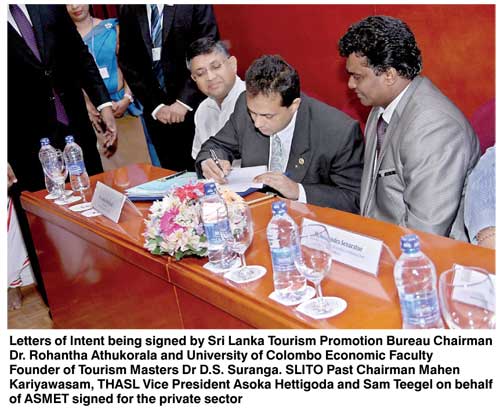Saturday Feb 28, 2026
Saturday Feb 28, 2026
Tuesday, 29 September 2015 00:30 - - {{hitsCtrl.values.hits}}
Sri Lanka Tourism engraved ‘World Tourism Day 2015’ with purpose by a backward integration partnership with Colombo University Economic faculty that conducts the Masters and Postgraduate programs for Tourism and Hotel Management under the leadership of Minister for Tourism Development and Christian Affairs John Amaratunga at the BMICH.
The partnership is sustainable given that it is a tripartite partnership between Sri Lanka Tourism, the University of Colombo and the private sector – Sri Lanka Association of Inbound Tour Operators (SLAITO), The Hotel Association of Sri Lanka (THASL) and  Association of Small and Medium Enterprises in Tourism (ASMET), said Minister Amaratunga.
Association of Small and Medium Enterprises in Tourism (ASMET), said Minister Amaratunga.
On behalf of Colombo University Rev W. Wimalaratne, Head of Economics and Founder/Coordinator for the Masters in Tourism program Dr. D. A Silva was present.
“Let us now identify the key issues the industry is facing and request the best brains in the country to recommend the strategies and best practices we must implement to make this industry be more competitive globally,” said Minister Amaratunga.
Sri Lanka Tourism Promotion Bureau Chairman Dr. Rohantha Athukorala orchestrated the partnership.
Dr. Silva, the Founder and coordinator of the Tourism Masters program, said: “The tourism business is the most competitive and dynamic industry one can work as it is to do with people’s leisure and their behaviour. Hence, this keeps changing daily where people are seeking new experiences in their life. This in turn demands the industry to change accordingly. If we do not, we will lose our competitiveness. This is where the Colombo University will help us bridge this gap. This makes the celebration of World Tourism Day very purposeful.”
“Universities globally are organisations that perform a key role within contemporary society by educating large proportions of the population and generating knowledge but many universities have taken action to develop a ‘third mission’ by fostering links with knowledge users and facilitating technology transfer. The latter is what we are interested in and the private sector tourism chambers- SLAITO, THASL and ASMET will be the key stakeholders in the partnership,” said Athukorala.
 Some of the key issues that were identified and shared at the World Tourism day with the University of Colombo were as follows:
Some of the key issues that were identified and shared at the World Tourism day with the University of Colombo were as follows:
“All copy research topics that have been approved by the senate will be available at the Sri Lanka Tourism library so that it can be used by the private sector which I will personally monitor,” commented Dr Athukorala.